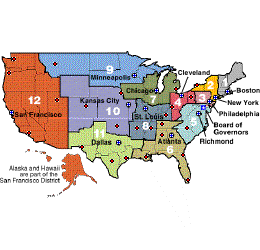
|
|
POLLUTION TYPES: Pollution residuals fall into one of three categories--degradable, nondegradeable, and persistent. Damage done by each type, and thus external cost, typically varies. At one extreme are degradable residuals and at the other are nondegradable. In the middle are persistent residuals.
Visit the GLOSS*arama
|
|


|

|
                           FEDERAL RESERVE DISTRICTS: The 12 geographic areas of the United States that form the administrative division of the Federal Reserve System. Each of the 12 Districts is headed by a Federal Reserve District Bank and is generally designated by the Reserve Bank City--Boston, New York, Philadelphia, Cleveland, Richmond, Atlanta, Chicago, St. Louis, Minneapolis, Kansas City, Dallas, and San Francisco. Federal Reserve Branch Banks are located in 10 of the 12 Districts. Federal Reserve Districts are the 12 administrative divisions established when the Federal Reserve System was created in 1913. Monetary activity within each district is supervised by a Federal Reserve District Bank, with support provided by 25 Federal Reserve District Banks. | Federal Reserve Districts |  |
A total of 37 Federal Reserve Banks are pinpointed. Each of the 12 color-coded Districts has its very own Federal Reserve District Bank. The 12 District Bank cities identified on the map are: Boston, New York, Philadelphia, Cleveland, Richmond, Atlanta, Chicago, St. Louis, Minneapolis, Kansas City, Dallas, and San Francisco. Several other cities marked on the map, 25 in total, are the homes of Federal Reserve Branch Banks.Each district is also commonly designated by number, letter, and/or location of the District Bank. From 1 to 12, A to L, the 12 banks are 1-A, Boston; 2-B New York; 3-C, Philadelphia; 4-D, Cleveland; 5-E, Richmond; 6-F, Atlanta; 7-G, Chicago; 8-H, St. Louis; 9-I, Minneapolis; 10-J, Kansas City; 11-K, Dallas; 12-L, San Francisco. Ten of the Federal Reserve Districts contain Branch Banks. Only the Boston and Philadelphia Districts have no Branch Banks. Branch Banks tend to be more numerous in the less densely populated, larger Federal Reserve Districts in the west and South. Cities containing the 25 Branch Banks, grouped according to their District Bank cities are: Boston (no Branch Banks); New York (Buffalo); Philadelphia (no Branch Banks); Cleveland (Cincinnati, Pittsburgh); Richmond (Baltimore, Charlotte); Atlanta (Birmingham, Jacksonville, Miami, Nashville, New Orleans); Chicago (Detroit); St. Louis (Little Rock, Louisville, Memphis); Minneapolis (Helena); Kansas City (Denver, Oklahoma City, Omaha); Dallas (El Paso, Houston, San Antonio); and San Francisco (Los Angeles, Portland, Salt Lake City). When the Federal Reserve System was established in 1913, the United States was divided into 12 Districts, each headed by a Federal Reserve District Bank. The configuration of the United States into these 12 Districts resulted for a couple of reasons: - One, the guiding philosophy behind the formation of the Federal Reserve System in the early 1900s was a decentralized central bank. The creators did NOT want a central bank located exclusively in New York City or Washington, D.C. Hence the system was set up with not just one bank, but 12 somewhat autonomous banks (plus 25 branch banks).
- Two, when the Federal Reserve System was established in 1913 communication and transportation systems were slower and less efficient than today. To extend assistance to and control over ALL banks in the economy, the Federal Reserve System needed facilities dispersed throughout the country. A single, centralized regulatory bank simply was not a pragmatic option.
The configuration of the Federal Reserve Districts is presented in this nice little map of the U.S. of A. The Districts generally contain complete states, but a few states find themselves divided between Districts.

Recommended Citation:FEDERAL RESERVE DISTRICTS, AmosWEB Encyclonomic WEB*pedia, http://www.AmosWEB.com, AmosWEB LLC, 2000-2025. [Accessed: July 18, 2025].
Check Out These Related Terms... | | | | | | | | | | | | | |
Or For A Little Background... | | | | | | | | | | |
And For Further Study... | | | | | | | | | | | |
Related Websites (Will Open in New Window)... | |
Search Again?
Back to the WEB*pedia
|



|

|
BLACK DISMALAPOD
[What's This?]
Today, you are likely to spend a great deal of time browsing about a thrift store seeking to buy either a genuine fake plastic Tiffany lamp or a microwave over that won't burn your popcorn. Be on the lookout for small children selling products door-to-door.
Your Complete Scope
This isn't me! What am I?
|

|
|
The first U.S. fire insurance company was established by Benjamin Franklin in 1752 in Philadelphia.
|

|
|
"A winner is someone who recognizes his God-given talents, works his tail off to develop them into skills, and uses those skills to accomplish his goals. " -- Larry Bird, basketball player
|

|
MPI
Marginal Propensity to Invest
|

|
|
Tell us what you think about AmosWEB. Like what you see? Have suggestions for improvements? Let us know. Click the User Feedback link.
User Feedback
|


|


